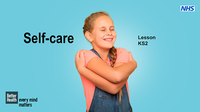Self-care – KS2 lesson plan
Developed with teachers and NHS-approved, this lesson explores what self-care is and why it is important. After evaluating the "ways to wellbeing" including connect, be active, learning, kindness, take notice, play and creativity, pupils try out different self-care strategies and create a self-care plan.
A "Guidance for teachers" document contains details on how to link mental wellbeing lesson plans to school-wide approaches in place around social and emotional learning.
Curriculum
Supports the Relationships and Health Education curriculum
By the end of primary school, pupils should know:
- that mental wellbeing is a normal part of daily life, in the same way as physical health
- the benefits of physical exercise, time outdoors, community participation, voluntary and service-based activity on mental wellbeing and happiness
- simple self-care techniques, including the importance of rest, time spent with friends and family and the benefits of hobbies and interests
- isolation and loneliness can affect children and that it is very important for children to discuss their feelings with an adult and seek support
Supports the PSHE curriculum
KS2 – Pupils learn:
- H18 – about everyday things that affect feelings and the importance of expressing feelings
- H20 – strategies to respond to feelings, including intense or conflicting feelings; how to manage and respond to feelings appropriately and proportionately in different situations
Learning outcomes
After this lesson, pupils will be able to:
- explain what self-care is and why it is important
- evaluate different self-care strategies
- plan self-care activities to support wellbeing
Resource details
- Topics: Schools
- Target audience: Students and teachers
- Published: 22 August 2024
- Last updated: 8 August 2024
